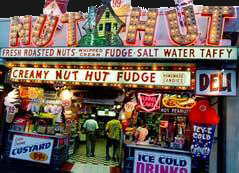by Bob Rixon
From the mainland, the psychedelic Ferris Wheel on the Wildwood
boardwalk is clearly visible at night across a dark stretch of bay and
marsh, flashing through a series of twirling patterns. From the top of
that Ferris Wheel, gently swinging in a cage, you look down on Mariner’s
Landing, a pier insanely jammed with amusement rides and a water park.
Yet, it will be strangely quiet in your perch, and you might believe that
you are in the most perfect of worlds at that moment, because Mariner’s
Landing is at the junction of Boardwalk and Schellenger Avenue, one of this
world’s magical intersections on any August night.
Here, in the space of a hundred wonderfully noisy, pungent, chaotic
yards, are two piers, three amusement areas, innumerable food stands, stores
hawking gold jewelry and $2 earrings, games of chance, racks of vulgar
tee shirts, and a truly bizarre-looking candy and snack shop called The
Nut Hut. An elbow-to-elbow crowd flows slowly along the boardwalk,
like salt water taffy oozing from a stainless steel machine. Wildwood’s
famous boardwalk trams constantly announce the prerecorded message, “Watch
the tram cars, please!” Their electric motors whine as they roll past.
 Just south of Schellenger Avenue is an arcade. At the front
of this arcade, a game requiring equal parts skill and chance is played.
And this game is run by The World’s Greatest Boardwalk Barker.
His face and voice are familiar to the thousands who stop to play his
game, or who just pause as they pass by him, but his name is unknown
to nearly all. . It’s a horse race game. The Greatest Boardwalk Barker sits
in an open booth high above the starting gate where he can survey
the game itself and boardwalk in front of the arcade. You give his boy behind
the counter a buck, you’re given a ball, a bell clangs, the William Tell
Overture plays, and you roll the ball over and over as fast as you can into
a small hole in front of you. This sends an electric signal to one of ten
plastic horses that are galloping toward the finish line. The ball doesn’t
always go in.
Just south of Schellenger Avenue is an arcade. At the front
of this arcade, a game requiring equal parts skill and chance is played.
And this game is run by The World’s Greatest Boardwalk Barker.
His face and voice are familiar to the thousands who stop to play his
game, or who just pause as they pass by him, but his name is unknown
to nearly all. . It’s a horse race game. The Greatest Boardwalk Barker sits
in an open booth high above the starting gate where he can survey
the game itself and boardwalk in front of the arcade. You give his boy behind
the counter a buck, you’re given a ball, a bell clangs, the William Tell
Overture plays, and you roll the ball over and over as fast as you can into
a small hole in front of you. This sends an electric signal to one of ten
plastic horses that are galloping toward the finish line. The ball doesn’t
always go in.
The World’s Greatest Boardwalk Barker calls this race like a feature
at Belmont Park. It’s your money, your pony, and your prize if you win,
and if every horse carries a bet, somebody’s got to be a winner.
He fills all the seats all night, every race. His secret is how he
makes the prizes grow bigger and grander, although mostly they stay the
same. If you stick around you’ll eventually win a prize, and it’s a good
thing you lost, because you might have won a Mickey Mouse doll but now
he’s “giving away a three foot high giant stuffed teddy bear.”
Maybe it’s only his job, and of course he wants your money, but give
him credit for dispensing hope; his heart is in his work. He is never
distracted from this work, even when a young employee who toils in the
depths of the arcade consults with him on some petty business matter.
He leans over the side of his throne, offers a few instructions, and the
problem is settled.
When the night becomes old and damp, and the crowds thin down to
Lost Souls, Childhood Sentimentalists, plus the Usual Suspects; when giant
moths flap themselves to death against the hot, strobe lights of The Nut
Hut; when you find yourself standing as an empty-handed supplicant in the
arcade’s gaudy midnight glow, The Greatest Boardwalk Barker senses your
need and your skepticism:
“Ladies and gentlemen,” he announces, “I’ve saved the best for last.
I’m earning nothing on this final race, this one last chance, because I’m
giving away love, and if all the seats are filled, somebody’s got to be
a winner.”
Adapted from the poem of the same title.